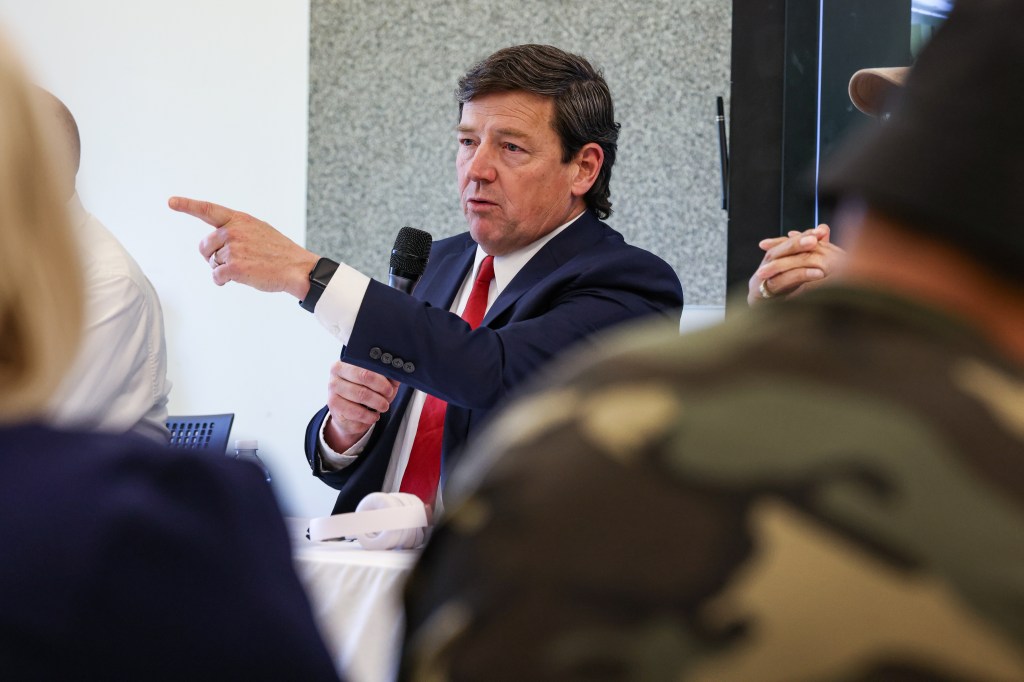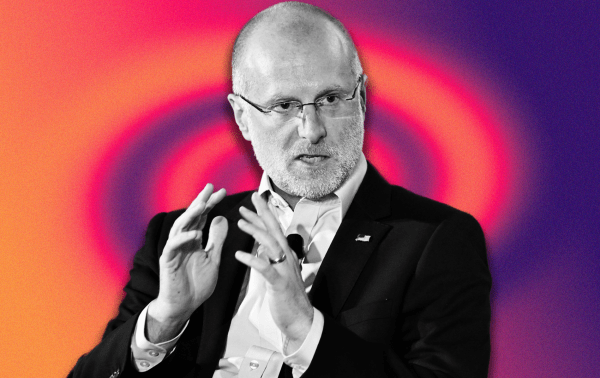Among Donald Trump’s team of losers, few are more emblematic of how unbending loyalty outweighs political success than Ed Martin, the acting United States attorney for the District of Columbia.
Martin, 54, has never won an election for public office, despite running multiple times. His tenure as chairman of the Missouri Republican Party more than a decade ago was unremarkable, while his time as chief of staff to Missouri’s governor ended with Martin resigning amid a scandal. For years before Trump entered the political arena, Martin bounced around various conservative advocacy groups in Missouri and nationally without much in the way of real victories to his name.
But since 2016, Martin has attached himself, like a barnacle, to the hull of the Trump ship. For 10 years, he has been a prominent conservative defender of Trump in op-eds and media appearances. He later became a vocal proponent of the idea that the 2020 election had been stolen from Trump, attended the march on the Capitol on January 6, 2021, and even represented January 6 defendants. When the House select committee investigating that event subpoenaed him, he refused to show up. For all this, he was rewarded with a post as the top federal prosecutor in the nation’s capital.
Of course, Martin’s combative style and “Stop the Steal” past are big reasons his days in this particular office might be numbered. His statutorily limited time as an acting employee, defined as 120 days by the Federal Vacancies Reform Act, ends later this month on May 20. There are signs suggesting the Senate may not confirm him, especially since Democratic Sen. Adam Schiff of California placed a hold on his nomination last month, meaning Republicans will have to spend valuable floor time to get around this procedural block.
On Monday evening and with Martin’s deadline rapidly approaching, Trump himself lent his nominee support in a Truth Social post. “Ed Martin is going through the approval process to be U.S. Attorney in the District of Columbia. According to many but, in particular, Robert F. Kennedy, Jr., his approval is IMPERATIVE in terms of doing all that has to be done to SAVE LIVES and to, MAKE AMERICA HEALTHY AGAIN. This is a passion for Ed, more so than for almost anyone that I have seen,” Trump posted. “We are going to take our Country BACK, and FAST. Ed Martin will be a big player in doing so and, I hope, that the Republican Senators will make a commitment to his approval, which is now before them.”
And for the past 100-plus days Martin, who did not respond to a request for comment, has been proving his commitment to MAGA. He’s tried to use his plum post at the Department of Justice as a blunt political force to fight Trumpian culture wars, threatening legal action against everyone from obscure medical journals to Wikipedia. In January, Martin dismissed all of the prosecutors in his office who had been working on January 6 riot cases. In a slavering letter to Elon Musk, Martin has offered staff resources to “protect” DOGE staffers and promised to “pursue any and all legal action against anyone who impedes your work or threatens your people.” And from his official DOJ Twitter account, he has amplified evidence-free claims that certain high-ranking foreign policy officials from the Biden administration have violated the law.
One of Martin’s most notorious actions came in February, when he sent a letter to the dean of the Georgetown University Law Center declaring the school’s teaching and promotion of DEI (that is, diversity, equity, and inclusion) is “unacceptable.”
“At this time, you should know that no applicant for our fellows program, our summer internship, or employment in our office who is a student or affiliated with a law school or university that continues to teach and utilize DEI will be considered,” Martin wrote.
William Treanor, the dean of the Jesuit university’s law school, replied in a letter that effectively told Martin to pound sand. The First Amendment, Treanor reminded him, protects Georgetown University from government interference in what and how it teaches.
“This is a bedrock principle of constitutional law – recognized not only by the courts, but
by the administration in which you serve,” the dean wrote. “The Department of Education confirmed last week that it cannot restrict First Amendment rights and that it is statutorily prohibited from ‘exercising control over the content of school curricula.’”
Still, given his temporary status, Martin’s U.S. attorney tenure has so far been pretty much all hat and no cattle, a familiar dynamic for longtime observers of his political career. Born in New Jersey, Martin came to Missouri when he decided to attend Saint Louis University’s law school. After graduating, he worked for the Archdiocese of St. Louis as the head of its human rights office. “Ed did not understand the difference between charity and human rights,” Angie O’Gorman, a staffer in the office whom Martin fired, later told St. Louis Magazine.
Following a few years of working in private practice, representing pro-life organizations and getting involved in conservative activism, Martin was hired in 2006 to serve as chief of staff to Matt Blunt, Missouri’s young, first-term Republican governor who found himself struggling in the polls and in need of a political bruiser.
“He’s extraordinarily good at politics,” Emily Lampkin, a conservative activist originally from St. Louis, told me. “If I had to go into a political battle, I’m totally taking Ed.”
But in Blunt’s office, things went awry quickly. Martin’s habit of deleting his work emails, in apparent violation of the state’s “sunshine” government records law, raised the internal alarms of an attorney on Blunt’s staff, whom Martin subsequently fired. The attorney sued for wrongful termination, which prompted a media blitz to get access to the emails and a special investigation by the office of the Democratic attorney general. Martin, it turned out, was not only alleged to have violated the sunshine law but appeared to have used his official position to coordinate with outside political groups improperly. In November 2007, Martin resigned from his position without explanation, and Blunt soon after announced he would not run for reelection. (The investigation ended after Blunt left office, and without a conclusive report.)
A few years later, Martin himself tried to run for office, coming tantalizingly close (by just a couple thousand votes) to defeating incumbent Democratic Rep. Russ Carnahan in 2010, otherwise a banner year for Republican House candidates. A few months later, Martin tried again, first setting his sights on challenging Sen. Claire McCaskill in the 2012 cycle before deciding instead to run for a different House seat held by Republican Todd Akin, who was running in the Senate race. Martin dropped out of the crowded House primary as well in order to run for state attorney general. He won the Republican primary but lost the general election to the incumbent, Democrat Chris Koster.
Apparently chastened out of a career as a candidate, Martin was elected chairman of the Missouri GOP in 2013, serving for a little over two years. In 2015 Martin got involved with the Eagle Forum, a longtime conservative advocacy group based in St. Louis and founded by the legendary activist Phyllis Schlafly. It was a collaboration doomed to divide the organization and the Schlafly family as soon as Martin took over as president of Eagle Forum in 2015.
A dispute arose over whom the organization should endorse in the Republican nomination for president—some of the board (including Anne Schlafly Cori, one of Schlafly’s daughters) wanted to support Texas Sen. Ted Cruz, but others preferred Trump, including Martin and several others among Schlafly’s children. Schlafly’s advanced age and cancer diagnosis complicated the story of who better represented the conservative icon’s views. The Eagle Forum board removed Martin, and he and the other pro-Trump members departed to start Phyllis Schafly’s Eagles, a competing organization. For years, the Schlafly family was torn apart by the subsequent litigation.
“Ed is a pathological liar,” Cori told me recently. The youngest Schlafly child, who now chairs the Eagle Forum, has claimed that Martin took advantage of her mother in her final years to sway her toward Trump. The book Phyllis Schlafly coauthored with Martin, The Conservative Case for Trump published in September 2016 the day after she died.
During Trump’s first term, Martin was a dedicated pro-Trump voice on radio and TV, including a brief stint as an on-air contributor to CNN. In 2019, he gave elected office one more go, getting trounced in a longshot bid for a seat on the board of supervisors in Fairfax County, Virginia. But within two years, he would find his next calling as a prominent advocate for Trump’s false claims about the 2020 election being stolen. Martin appeared at the January 6 rally on the Ellipse and later marched on the Capitol, though he did not appear to enter the building or break any laws that day. And he later represented January 6 defendants, including Proud Boys members, in court.
From there, his path was clear. Martin was named deputy director of the 2024 Republican National Committee platform committee, and had initially been named chief of staff at the Office of Management and Budget during Trump’s transition last year before being tapped for the U.S. attorney role, despite having little apparent experience as a prosecutor.
It’s been a long journey, but Martin finally made his way to the halls of power in Washington. And even if Schiff’s hold on his nomination and Republican squeamishness about approving him means Martin has to leave office on May 20, it’s unlikely to be the last stop in this administration for the ambitious but long-struggling political figure.










Please note that we at The Dispatch hold ourselves, our work, and our commenters to a higher standard than other places on the internet. We welcome comments that foster genuine debate or discussion—including comments critical of us or our work—but responses that include ad hominem attacks on fellow Dispatch members or are intended to stoke fear and anger may be moderated.
With your membership, you only have the ability to comment on The Morning Dispatch articles. Consider upgrading to join the conversation everywhere.